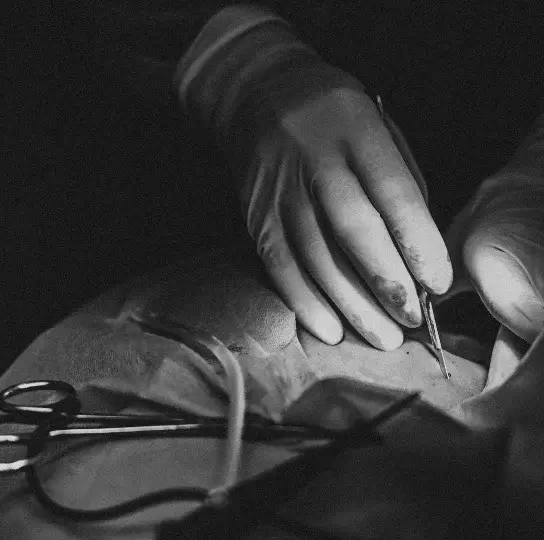“After James’ minister gave a brief eulogy, his cousin sang the Lord’s Prayer and Dr. Samuels’ nurse turned off the console that supplied power to James Quinn’s artificial heart.
Suddenly, Mr. Quinn sat bolt upright and thrust his arms out as if to the heavens before crossing his hands and lying back down. “You’re killing him!” screamed his wife Irene. “He wasn’t ready!” (Washington, 2006).
Mrs. Quinn’s Grief
Mrs. Quinn, James’ wife, couldn’t help but relive the heavy burden crushing her spirit. Grief and sorrow vibrated in the depths of her soul as she realized the patient advocate, though it may seem strange, advocated for the hospital and the company’s interests. It felt like a betrayal, sinking her into a sea of confusion and doubt.
Overwhelming Memories
Like an unfamiliar song on replay, the technical language and scientific jargon the couple experienced echoed in her mind, overpowering her senses. This is the story of African-American James Quinn and the experimental procedure of the AbioCor artificial heart.
James Quinn Artificial Heart Journey
Mrs. Quinn’s husband, James Quinn, was diagnosed with heart failure and given six months to live.
He was the second patient of six to receive the experimental AbioCor heart, following telephone employee Robert Tools, a 59-year-old African-American diabetic with a history of heart problems.
Robert chose the surgery after being deemed too old and sick for a traditional heart transplant. Despite hopes for a new lease on life, Robert Tools tragically passed away five months after the surgery.
Motivated by Hope
Representatives for the AbioCor artificial heart approached Mr. Quinn for the trial procedure. James harbored concerns about losing his human heart and wondered if he’d still experience the same emotions.
He and his wife were told that getting the experimental heart would allow him to be more active and that this surgery was his best shot at a life full of meaning in the months to come.
Motivated by hope of leaving the hospital and reuniting with his wife and grandchildren, he gave his consent to undergo the experimental procedure.
On November 5, 2001, James Quinn underwent implantation surgery to receive AbioCor’s experimental heart.
But just weeks later, tragedy struck. James experienced disruption of blood flow or bleeding in the brain, causing him to have a stroke, leaving him struggling to walk and in excruciating pain.
Then, the doctors diagnosed him with pneumonia, further worsening his condition.
He descended to a state of complete loss—of thoughts, movement, feelings, sight, and speech—declared brain dead as the experimental heart, a softball sized pump powered by batteries, continued to pulsate within his chest.
The Company’s Shortcomings
Abiomed, the company responsible for the AbioCor heart device, fell short of the company’s claim that James would enjoy a ‘six-month window of good living’ with the AbioCor device. Despite surviving 289 days after the surgery, he was never strong enough to walk out of the hospital and reunite with his wife and grandchildren.
Tragic End
In a heart-wrenching scene, family, friends, and the family minister gathered at the bedside of the 51-year-old Vietnam veteran to bid their final farewells.
Their tear-stained faces reflected the profound loss felt by all who knew him. Then, the console supplying power to James’ heart was turned off, marking the end of his life.
Results of AbioCor Heart Implants
By 2005, all fourteen patients who had received AbioCor artificial hearts had died. Two patients died immediately after the surgery.
Ten couldn’t handle the medicine that was supposed to stop blood clots. Additionally, the device failed twice, resulting in six patients suffering from strokes. These strokes made their health decline rapidly.
After her husband’s passing, Mrs. Quinn maintained that Abiomed Corporation had withheld complete information about all the potential dangers of the experimental procedure.
When Mr. Quinn first found out about his condition, he and his wife were told he only had six months left with his weak heart.
If the circumstances of Mr. Quinn signing the consent forms are true, then maybe he would have said no to the risky procedure. He might have preferred to take his chances and spend more time making memories with his family.
Seeking Justice
To Make Things Worse, Abiomed applied to the FDA for permission to market the artificial heart as a humanitarian device. They also requested FDA approval for the experimental implantation of the artificial heart without obtaining informed consent from patients. The FDA denied their request.
Good informed consent practices involve a few key steps. First, healthcare providers need to clearly explain the diagnosis, treatment options, risks, benefits, and potential outcomes in a way that patients can easily understand.
Next, they should make sure the patient really gets the information by asking them to explain it back or answer some questions about it.
It’s also important that patients make their decisions freely, without feeling pressured by anyone.
Finally, the entire process and the patient’s agreement should be well-documented, usually with a signed consent form, to keep a clear record of the patient’s informed choice.
According to James Quinn’s wife Irene, someone involved deliberately overlooked one or more of the steps in this process.
In 2003, on behalf of her deceased husband, Mrs. Quinn sued the device manufacturer Abiomed and the hospital. She and the company reached a $125,000 settlement.
Ethical Considerations
The debate surrounding James Quinn, like many other black people who were pioneers in dangerous and untested surgeries, brings up a crucial point about how they were perceived as worthless.
As advancements are made and procedures become safer, do you think black families are being left out of the very breakthroughs they helped bring about?
Discover the ‘Terror Dome’ of Holmesburg Prison-where the living were sent to be forgotten.
Citation/Other Sources:
Washington, H. A. (2006). The Machine Age. In Medical Apartheid: The Dark History of Medical Experimentation on Black Americans from Colonial Times to the Present. Anchor Books.
https://www.accessdata.fda.gov/cdrh_docs/pdf4/h040006b.pdf https://www.wired.com/2001/08/the-man-with-the-artificial-heart/

